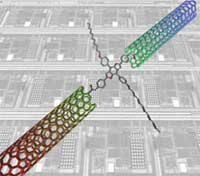An interdisciplinary team from Columbia University has figured out a way to study single-molecule interactions on very short time scales using nanoscale transistors. The Columbia researchers, including Professor of Electrical Engineering Ken Shepard, Professor of Chemistry Colin Nuckolls, and graduate students Sebastian Sorgenfrei and Chien-Yang Chiu, show how, for the first time, transistors can be used to detect the binding of the two halves of the DNA double helix with the DNA tethered to the transistor sensor. The transistors directly detect and amplify the charge of these single biomolecules. The researchers realized that transistors, like those used in modern integrated circuits, have reached the same nanoscale dimensions as single molecules. “So this raised the interesting question as to whether these very small transistors could be used to study individual molecules,” said Sorgenfrei, the lead author on the study. They have discovered that the answer is "yes." The transistors employed in this study are fashioned from carbon nanotubes, which are cylindrical tubes made entirely of carbon atoms. While these are still emerging devices for electronics applications, they are exquisitely sensitive because the biomolecule can be directly tethered to the carbon nanotube wall creating enough sensitivity to detect a single DNA molecule. “The area of single molecule research is an important one and pushes the envelope on our sensing systems. There is a huge potential for modern nanoelectronics to play an important role in this field. Our work, which has been a terrific collaboration between groups from Electrical Engineering, Chemistry, and Physics, is a great example of how nanoelectronics and biotechnology can be combined to produce new, exciting results,” raved Ken Shepard, Professor of Electrical Engineering at Columbia Engineering.
Zero

